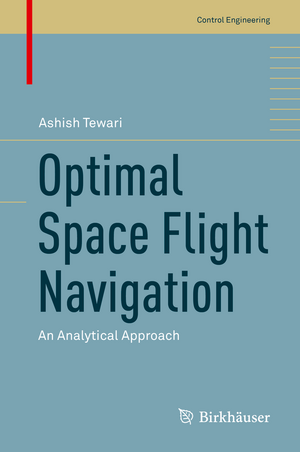Optimal Space Flight Navigation: An Analytical Approach: Control Engineering
Autor Ashish Tewarien Limba Engleză Hardback – 14 ian 2019
This book consolidates decades of knowledge on space flight navigation theory, which has thus far been spread across various research articles. By gathering this research into a single text, it will be more accessible to students curious about the study of space flight navigation. Books on optimal control theory and orbital mechanics have not adequately explored the field of space flight navigation theory until this point.
The opening chapters introduce essential concepts within optimal control theory, such as the optimization of static systems, special boundary conditions, and dynamic equality constraints. An analytical approach is focused on throughout, as opposed to computational. The result is a book that emphasizes simplicity and practicability, which makes it accessible and engaging. This holds true in later chapters that involve orbital mechanics, two-body maneuvers, bounded inputs, and flight in non-spherical gravity fields.
The intended audience is primarily upper-undergraduate students, graduate students, and researchers of aerospace, mechanical, and/or electrical engineering. It will be especially valuable to those with interests in spacecraft dynamics and control. Readers should be familiar with basic dynamics and modern control theory. Additionally, a knowledge of linear algebra, variational methods, and ordinary differential equations is recommended.
Din seria Control Engineering
- 18%
 Preț: 769.02 lei
Preț: 769.02 lei - 18%
 Preț: 822.82 lei
Preț: 822.82 lei - 18%
 Preț: 891.06 lei
Preț: 891.06 lei - 20%
 Preț: 800.64 lei
Preț: 800.64 lei - 18%
 Preț: 978.69 lei
Preț: 978.69 lei - 15%
 Preț: 702.54 lei
Preț: 702.54 lei - 18%
 Preț: 947.85 lei
Preț: 947.85 lei - 18%
 Preț: 730.02 lei
Preț: 730.02 lei - 18%
 Preț: 945.30 lei
Preț: 945.30 lei - 15%
 Preț: 648.24 lei
Preț: 648.24 lei - 15%
 Preț: 652.64 lei
Preț: 652.64 lei - 15%
 Preț: 641.35 lei
Preț: 641.35 lei - 15%
 Preț: 650.86 lei
Preț: 650.86 lei - 15%
 Preț: 652.49 lei
Preț: 652.49 lei - 15%
 Preț: 647.27 lei
Preț: 647.27 lei - 15%
 Preț: 538.76 lei
Preț: 538.76 lei -
 Preț: 380.84 lei
Preț: 380.84 lei - 15%
 Preț: 707.78 lei
Preț: 707.78 lei - 18%
 Preț: 1113.89 lei
Preț: 1113.89 lei - 18%
 Preț: 1683.66 lei
Preț: 1683.66 lei -
 Preț: 400.65 lei
Preț: 400.65 lei - 15%
 Preț: 650.86 lei
Preț: 650.86 lei - 18%
 Preț: 952.72 lei
Preț: 952.72 lei - 15%
 Preț: 704.87 lei
Preț: 704.87 lei - 18%
 Preț: 950.96 lei
Preț: 950.96 lei - 18%
 Preț: 1025.16 lei
Preț: 1025.16 lei - 18%
 Preț: 960.78 lei
Preț: 960.78 lei - 15%
 Preț: 580.17 lei
Preț: 580.17 lei - 15%
 Preț: 643.34 lei
Preț: 643.34 lei -
 Preț: 394.12 lei
Preț: 394.12 lei - 20%
 Preț: 654.55 lei
Preț: 654.55 lei - 19%
 Preț: 569.56 lei
Preț: 569.56 lei - 18%
 Preț: 952.40 lei
Preț: 952.40 lei
Preț: 646.11 lei
Preț vechi: 760.13 lei
-15% Nou
Puncte Express: 969
Preț estimativ în valută:
123.67€ • 134.38$ • 103.95£
123.67€ • 134.38$ • 103.95£
Carte tipărită la comandă
Livrare economică 21 aprilie-05 mai
Preluare comenzi: 021 569.72.76
Specificații
ISBN-13: 9783030037888
ISBN-10: 3030037886
Pagini: 254
Ilustrații: XI, 270 p. 65 illus. in color.
Dimensiuni: 155 x 235 mm
Greutate: 0.58 kg
Ediția:1st ed. 2019
Editura: Springer International Publishing
Colecția Birkhäuser
Seria Control Engineering
Locul publicării:Cham, Switzerland
ISBN-10: 3030037886
Pagini: 254
Ilustrații: XI, 270 p. 65 illus. in color.
Dimensiuni: 155 x 235 mm
Greutate: 0.58 kg
Ediția:1st ed. 2019
Editura: Springer International Publishing
Colecția Birkhäuser
Seria Control Engineering
Locul publicării:Cham, Switzerland
Cuprins
1. Introduction.- 2. Analytical Optimal Control.- 3. Orbital Mechanics and Impulsive Transfer.- 4. Two-Body Maneuvers with Unbounded Continuous Inputs.- 5. Optimal Maneuvers with Bounded Inputs.- 6. Flight in Non-spherical Gravity Fields.
Recenzii
“The book under review provides a comprehensive treatment of optimal space flight, covering most of the problems and main results that have appeared in the published literature. The book is a welcome addition in that it provides a self-contained introduction to the field that should be of broad interest to applied mathematicians, physicists and engineers.” (N. Harris McClamroch, Mathematical Reviews, July, 2019)
“This book is designed to be used as a textbook in a course on optimal space flight at the graduate and senior undergraduate levels, but it is very useful also for all control scientists and control engineers.” (Clementina Mladenova, zbMath 1412.49002, 2019)
Textul de pe ultima copertă
This book consolidates decades of knowledge on space flight navigation theory, which has thus far been spread across various research articles. By gathering this research into a single text, it will be more accessible to students curious about the study of space flight navigation. Books on optimal control theory and orbital mechanics have not adequately explored the field of space flight navigation theory until this point.
The opening chapters introduce essential concepts within optimal control theory, such as the optimization of static systems, special boundary conditions, and dynamic equality constraints. An analytical approach is focused on throughout, as opposed to computational. The result is a book that emphasizes simplicity and practicability, which makes it accessible and engaging. This holds true in later chapters that involve orbital mechanics, two-body maneuvers, bounded inputs, and flight in non-spherical gravity fields.
The intended audience is primarily upper-undergraduate students, graduate students, and researchers of aerospace, mechanical, and/or electrical engineering. It will be especially valuable to those with interests in spacecraft dynamics and control. Readers should be familiar with basic dynamics and modern control theory. Additionally, a knowledge of linear algebra, variational methods, and ordinary differential equations is recommended.
Caracteristici
Collects decades of knowledge regarding optimal space flight navigation theory in an accessible manner Emphasizes an analytical approach to optimal space navigation Guides readers from basic to advanced concepts using exercises and interesting examples
